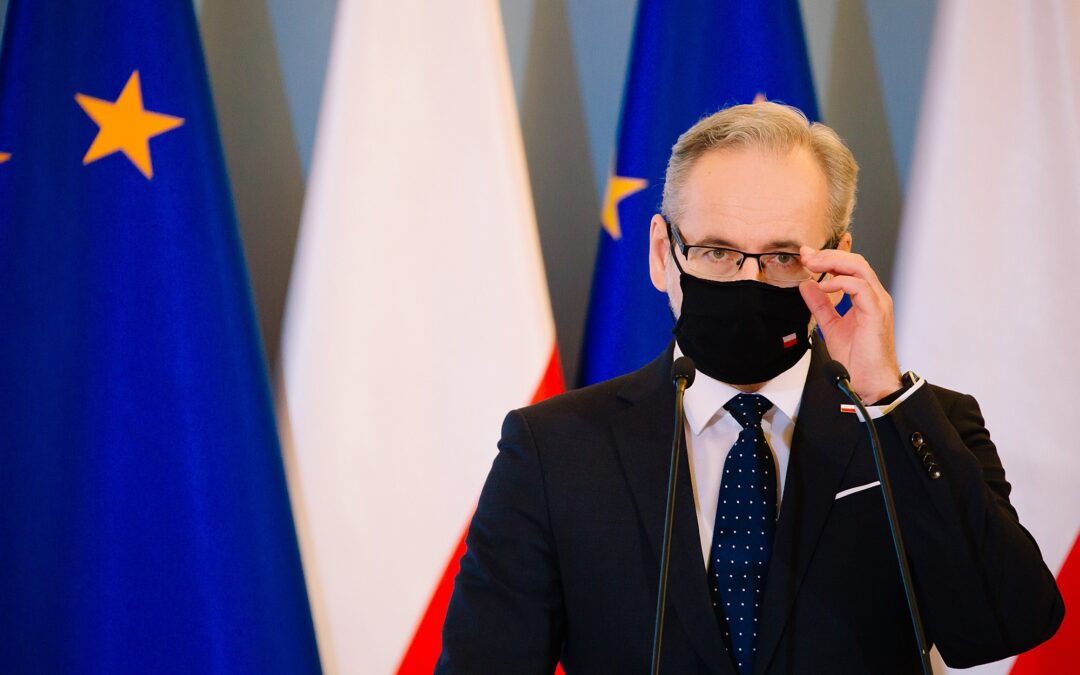Poland’s government has reintroduced tighter restrictions in the Warmia-Masuria province, which currently has the highest rate of COVID-19 infections of the country’s 16 regions, with schools, hotels and shopping malls closing on Saturday.
The government has also announced new rules for face covering, saying that visors or scarves, bandanas and similar garments can no longer be worn instead of protective masks.
And all people crossing the border from Czechia and Slovakia, with the exception of schoolchildren with their guardians and those who are completely vaccinated, will be subject to quarantine amid rising rates of infection in Poland’s two southern neighbours.
⚠️#Quarantine upon arrival from the Czech Republic🇨🇿 and Slovakia🇸🇰 from 27 February.
❗️Except for those vaccinated with two doses or tested negative for #COVID19. pic.twitter.com/UATHFUvRrm
— Chancellery of the Prime Minister of Poland (@PremierRP_en) February 24, 2021
Poland’s health minister Adam Niedzielski confirmed on Wednesday that previous pandemic restrictions will remain in force across the country. This means only pupils in the first three years of primary school can attend classes, gyms remain closed and restaurants can only serve take-aways.
Hotels, cinemas, theatres and swimming pools (except water parks) can operate in a limited capacity, as announced two weeks ago. Museums, art galleries and stores in shopping centres were previously also reopened.
In a press conference today, Niedzielski announced that as of Saturday, tighter restrictions will be reintroduced in the Warmia-Masuria province in response to the high infection rates in the region.
As of Saturday, hotels, shopping malls, cinemas, theatres, museums, galleries, swimming pools, tennis courts will all close in the province, and children in years 1-3 of primary school will return to online lessons.
“The provinces in the northern belt of Poland are the most affected by the epidemic. I am talking especially about Warmia-Masuria, but also Pomerania and Kuyavia-Pomerania,” said Niedzielski.
Warmia-Masuria currently has a positive test rate of 34% – compared to 19% for the rest of Poland – as well as almost 10% absences from schools due to isolation and quarantine, compared to 1-2% overall, he added.
The minister said that restrictions needed to be imposed on arrivals from Poland’s southern neighbours because of the high rate of infections in Czechia or Slovakia. All those arriving from the two countries will need to quarantine for 10 days unless they have received two coronavirus vaccine doses. Children and their guardians crossing the border to go to school are also exempted.
Travellers arriving in Poland from outside the European Union and those crossing a border from another EU country by organised transport (such as a plane or bus) are already obliged to quarantine.
“In Czechia and Slovakia the epidemic parameters are three or four times higher than in Poland….The condition for being released from quarantine is presenting a negative test taken place in the last 48 hours,” he said.
On Tuesday, Czechia reported 15,672 daily infections, its highest figure since 6 January, reports TVN24. Poland, which has a population more than three times larger, today also recorded its highest rate since 6 January, with 12,146 infections.
From the weekend it will also be compulsory to wear purpose-built medical or cloth masks covering the nose and mouth both inside as well outdoors. Visors, scarves, bandanas, snoods, buffs and other such coverings which had previously been allowed will no longer suffice.
“We recommend surgical masks and upwards,” said Iwona Paradowska-Stankiewicz, the government’s epidemiological adviser. “But those which are currently available, so-called single-user masks, can also be used. But if we are able to exchange them for surgical ones, that will be a good move.”
Minister @a_niedzielski w #MZ: Od 27 lutego wprowadzamy obowiązek zakrywania ust i nosa wyłącznie przy użyciu maseczki. Nie będzie można stosować szalików, kominów, chust, bandan i przyłbic. pic.twitter.com/yMSHEKMDRd
— Ministerstwo Zdrowia (@MZ_GOV_PL) February 24, 2021
Niedzielski warned that Poles still need to abide by rules to fight against the pandemic, encouraging them to continue to observe the “DDM” principle – disinfection, distance and mask – as well as adding two As – airing spaces and using the government’s Stop Covid application.
“We are still in a difficult situation. We haven’t gone down to a level of low numbers of infections – we’re starting the third wave from the level of 12,000 cases. That should motivate and encourage us to employ the rule of DDM+AA,” said Niedzielski on Thursday.
The government have been warning about a looming third wave of the virus since last week, noting increased infection rates and condemning “irresponsible” behaviour after the loosening of restrictions.

Ben Koschalka is a translator, lecturer, and senior editor at Notes from Poland. Originally from Britain, he has lived in Kraków since 2005.




















